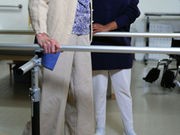

If possible, people who’ve had a stroke should be sent directly to inpatient rehabilitation after their hospital discharge. This would be instead of a skilled nursing facility or nursing home, according to new guidelines by the American Heart Association/American Stroke Association (AHA/ASA).
Inpatient rehabilitation may be part of the hospital. Or, it may be a freestanding facility.
Ideally, stroke patients should begin their rehabilitation before they even leave the hospital. For example, they should start to learn how to prevent falls while still in the hospital, the groups recommend. This includes tips on how to make their home safer such as by removing throw rugs and improving lighting.
Patients should also learn about the side effects of their medication and how to use devices such as wheelchairs, walkers and canes before they leave the hospital, the AHA/ASA advises.
“This recommendation will probably change medical practice. Even the top stroke centers may not have a formal falls-prevention program, but it is very important because a high percentage of patients end up falling after a stroke,” the lead author of the new guidelines, Carolee Winstein, said in an AHA/ASA news release.
Once discharged from the hospital, stroke patients should be sent to an inpatient rehab facility where they can continue their recover and receive more intensive therapy, the guidelines say.
“Previous guidelines have focused on the medical issues involved in the initial management of stroke, but many people survive a stroke with some level of disability. There is increasing evidence that rehabilitation can have a big impact on the survivors’ quality of life, so the time is right to review the evidence in this complex field and highlight effective and important aspects of rehabilitation,” said Winstein.
Winstein is a professor of biokinesiology and physical therapy at the University of Southern California in Los Angeles.
Unlike a nursing home, an inpatient rehabilitation facility provides patients with at least three hours of rehab on daily basis. Patients work with a range of health care providers. They may include physical therapists, occupational therapists and speech therapists, the AHA/ASA explained.
“If the hospital suggests sending your loved one to a skilled nursing facility after a stroke, advocate for the patient to go to an inpatient rehabilitation facility instead — unless there is a good reason not to, such as being medically unable to participate in rehab,” said Winstein.
“There is considerable evidence that patients benefit from the team approach in a facility that understands the importance of rehabilitation during the early period after a stroke,” she said.
Other recommendations issued by the AHA/ASA include:
- Stroke patients who have trouble walking should undergo intense mobility-task training to help relearn how to perform daily activities, such as climbing stairs.
- The use of a computer, books, music and virtual reality games could help enhance rehabilitation for stroke patients, making it more engaging and mentally stimulating.
- Stroke patients who have trouble speaking should undergo speech therapy.
- Patients who have vision problems and have trouble focusing should perform eye exercises.
- Balance training should be offered to stroke survivors at risk for falls.
- Exercise regimens tailored to individual stroke patients can help them continue to improve their fitness level once their rehabilitation is complete.
“For a person to fulfill their full potential after stroke, there needs to be a coordinated effort and ongoing communication between a team of professionals as well as the patient, family and caregivers,” said Winstein.
The new guidelines were published May 4 in the journal Stroke.
More information
The U.S. National Institutes of Health provides more information on rehabilitation after stroke.
Source: HealthDay
Copyright © 2025 HealthDay. All rights reserved.

Leave a Reply